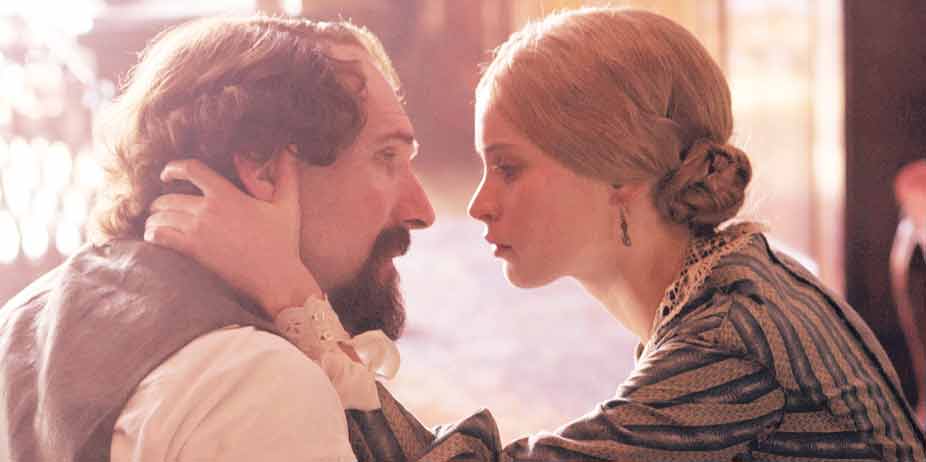 The
Invisible Woman (2013)
The
Invisible Woman (2013)
Famous novelist Charles Dickens is best known for his startling
insights into human nature and his memorable characters. Though
his books adhered to the social norms of the time in terms of
morality, his private life showed a sharp contrast to the
honorable, chaste heroes of his imagination. His biggest secret
was his mistress, Ellen Turner.
His name is famous throughout Europe, and his presence fills theater halls. Charles Dickens (Ralph Fiennes) is happily engaged in playacting and directing when he first encounters the introverted Nellie (Felicity Jones). An aspiring actress following in the footsteps of her mother and older sisters, Nellie’s small voice won’t carry far past the first row, but her genuine appreciation of the material wins his affection. Soon, Dickens finds reasons to attend her various plays in London, arousing the suspicions of her mother (Kristen Scott Thomas). Knowing her daughter isn’t likely to have a career in the theater, and knowing Dickens is not a man to engage his heart lightly, she gently nudges Nellie toward accepting the subtle romantic overtures of the famous author.
Nellie is uncomfortable with his attentions and the decidedly
immoral lifestyle of his friend Wilkie Collins (Tom Hollander),
who cohabitates with his mistress and has no interest in
marriage. Her situation is complicated by her own inability to
discern her true feelings for the writer, and Dickens’
increasingly alienating behavior from his wife (Gwendolen
Chatfield).
Some of the decisions made in the filming process are unusual;
the scenes transition back and forth between present-day Nellie
in her marriage and life after Dickens’ death and her earlier
years. It's a little jarring at first but reaches a certain kind
of harmony as we watch her past unfold as it simultaneously
impacts her future. The film is an exploration of past events
through a woman's inability to come to terms with her present
situation, but it concludes on a happy note as, liberated from
her burden, Nellie lets go of him at last. There’s an odd
absence of music at key moments, offset by jarring violin pieces
that to me felt out of place. It’s at times too quiet, while at
other times being too loud. However, it’s a beautifully written
exploration of one woman’s emotions in dealing with a
complicated series of events. This Dickens is much as the
genuine man was – both immensely charming and shockingly cruel
(the instance where he forces his wife to deliver Nellie’s
birthday present has a particular sting to it). Nellie is more
ambiguous and withdrawn than the flamboyant, enthusiastic,
attention-seeking Dickens, much as the real woman was –
difficult to read but also understandable in her choices.
The costuming and set design is lovely, and there are many
references to Dickens’ body of work, including the significance
of the final chapter of Great Expectations and
childhood experiences that inspired the actions of David
Copperfield. I would have preferred a bit less sensuality and a
lower rating (PG instead of R) but I enjoyed it nonetheless. It
does not condone nor excuse adultery yet allows us to understand
the complex individuals behind it. It haunts you both with its
simplistic beauty and its enigmatic characters. It exploits the
vices of Dickens without painting him as anything other than he
was – a brilliant but fallen man aspiring to greatness.
Sexual Content:
Two sexual encounters (we hear noise as they “finish” and the
woman rolls off the man; the other has gentle, barely visible
movement and is a head and shoulders shot); we see part of a
woman’s bare backside through an opening door, but she quickly
covers herself and turns.
Language:
None noted.
Violence:
A train overturns in an accident, leaving people injured and
dead (one is seen crushed under a fallen car, others have blood
on their faces).
Other:
Dickens hypnotizes people for fun as after-dinner entertainment.
Characters engage in an adulterous affair; another set of
characters lives together outside of marriage.
